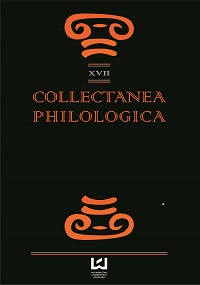Osservazioni sulla etimologia e funzione di due teonimi umbri
DOI:
https://doi.org/10.18778/1733-0319.17.06Słowa kluczowe:
Umbrian language, etymology, historical linguisticsAbstrakt
The article deals with the names of two Umbrian deities written in the Iguvine Tablets, PUEMUNE (dat. sg. m.) and VESUNE (dat. sg. f.). The author relates the Umbrian forms to the Indo-European roots *pō(i)- and *ṷes-, both of them meaning ‘to pasture’, which produce respectively: Lith. piemÂnÅ (f.) ‘shepherdess’, piemẽo (m.) ‘shepherd’, Gk. poim»n (m.) ‘id.’ and Hitt. ṷēštara- (c.) ‘shepherd’, Av. vāstar- (m.) ‘id.’. The Umbrian theonym PUEMUN- can be connected with the Lusitanian name of the pastoral goddess Poemanae (dat. sg. f.). The root ves- of the other Umbrian theonym can be compared with the root of the Lusitanian name Vestero (dat. sg. m.) ‘pastoral god’. The Umbrian noun has the suffix IE. *-H noH -, present in the Italic theonyms 1 2 (e.g. Lat. Pōmōna). Pieces of the same sheep were sacrificed to both deities, which additionally proves their pastoral function.
Pobrania
Opublikowane
Jak cytować
Numer
Dział
Licencja

Utwór dostępny jest na licencji Creative Commons Uznanie autorstwa – Użycie niekomercyjne – Bez utworów zależnych 4.0 Międzynarodowe.












